Recent News
World-class free diver to help BZS programmeFriday, February 27, 2015
Students are being offered the chance to learn about the Island’s marine environment from world-class South African free diver Hanli Prinsloo.
Regiment Volunteer Divers Take On Lionfish
Monday, February 02, 2015
A volunteer team of Regiment divers “declared war” on lionfish this past weekend.
Aquarium roof work on schedule
Thursday, January 15, 2015
Work on the aquarium’s new roof is over halfway complete and the project remains well on track, according to Dr Ian Walker.
Students Enjoy “Hands On” Learning With BZS
Wednesday, January 14, 2015
Whether for high school seniors about to head off to university, or preschoolers just beginning their educational career, the Bermuda Zoological Society [BZS] has been offering a wide variety of hands-on learning opportunities for Bermuda’s students for many years – and all free of charge for the students and teachers who attend.
Film star Douglas to narrate Ocean Vet
Monday, December 22, 2014
The announcement that Michael Douglas will narrate the upcoming Ocean Vet series is a fitting tribute to the man behind the nature documentary.
About
GovernanceAbout Us
Newsletter
Latest News
Gift & Bookstore
Contact
General Inquiries
info@bzs.bm
Latest News
All the latest updates and news from the Bermuda Aquarium, Museum, and Zoo, one of Bermuda's leading visitor attractions!
Owain Johnston-Barnes
Published Oct 25, 2017 at 8:00 am (Updated Oct 25, 2017 at 7:38 am)
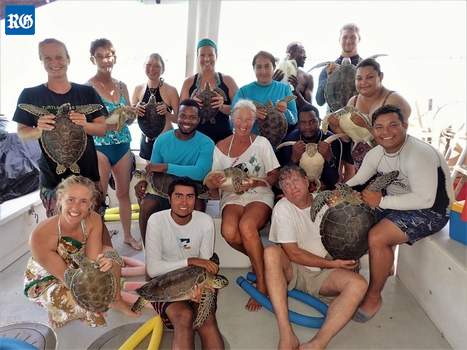
Shelling out: the Bermuda Turtle Project 2017’s
international course participants
Almost 200 turtles were plucked from the island’s waters this August as the Bermuda Turtle Project continued its conservation work.
While fewer turtles were found at offshore sites, the number of small turtles found closer to shore have risen.
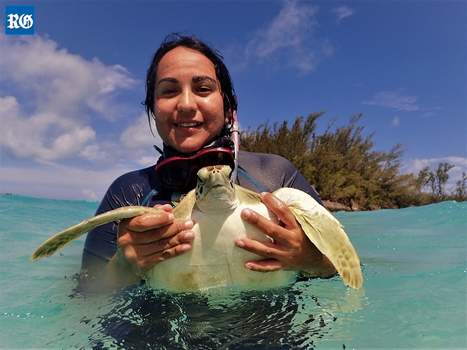
A fine specimen: Sandra Gallegos, from Mexico,
captures a healthy green turtle
A spokesperson for BTP said: “Following hatching on the nesting beach, sea turtles spend a few years out in the open ocean before moving into coastal habitats such as Bermuda.
“The increase in small turtles is not unexpected given the increase in the major nesting populations known to contribute to the green turtle aggregation in Bermuda. The organisation added that nesting populations in Costa Rica, Florida and Mexico have all grown thanks to conservation efforts.
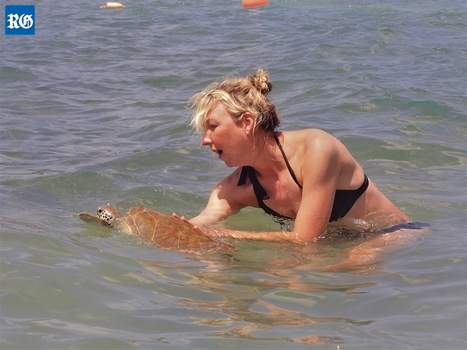
Gently does it: Abigail Alldis, a Bermuda participant,
gently releases a green turtle
BTP was first launched in 1968 to learn more about Bermuda’s turtles.
This year, volunteers and organisers visited 14 sites over a two-week period in August, catching and releasing 194 green turtles.
While fewer turtles and seagrass were found in areas like Fort St Catherine and Grotto Bay, other areas including Bailey’s Bay and Somerset Long Bay continued to be rich with turtles.
The spokesperson added: “Among the capture were 68 turtles that had been previously tagged, most in the same site as their original capture. One had a 12-year BTP history.”
The organisation said that the number of turtles in Bermuda has not changed significantly in recent years, their distribution has.
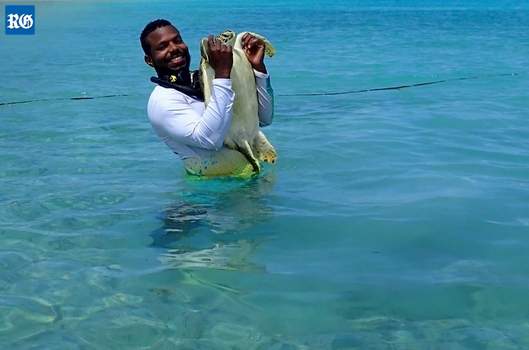
Gotcha! Damany Calder, from Jamaica,
captures a green turtle in the shallows
The spokesperson said: “With most boating activity and observations by the community taking place near shore, it makes sense that we perceive there are more turtles, but so far it just looks like they are all moving closer to shore.”
The team also performed 17 necropsies, examining dead turtles to find out what killed them.
While the results were “not out of the ordinary”, more turtles appeared to have been hit by boats than in previous years.
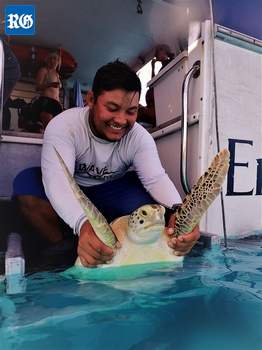
“This could well be because there were more boats out on the water in 2017 and our sea turtle hotline was promoted island- wide,” the organisation said.
“Six of the animal necropsies had propeller or blunt trauma scars indicative of boat strikes.
“Two died because of entanglement in monofilament fishing line and for the remainder we were not able to conclusively identify the cause of death. Unless the animals are fresh dead when they are examined, it is challenging to determine the cause of death.”
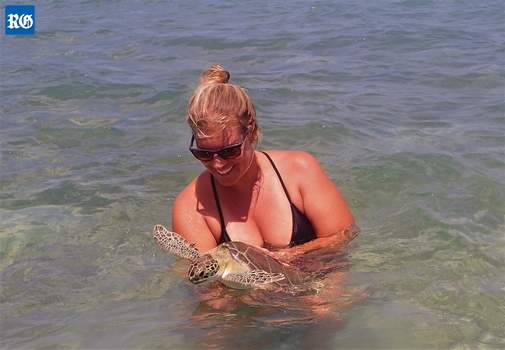
This year, the BTP was assisted by environmental officers and biologists from Jamaica, Mexico, Guatemala, Anguilla, Costa Rica and the Turks and Caicos, along with two candidates from Bermuda.
Through the course, they were able to practise a number of research methods, discuss scientific papers, attend lectures and deploy a satellite transmitter.


